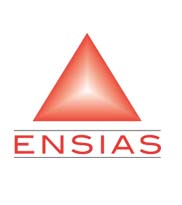- Accueil
-
L'Ecole
-
FORMATIONS
-
FORMATION INGENIEUR
-
Nouvelles filières offertes
- Ingénierie Intélligence Artificielle (2IA)
- Smart Supply Chain & Logistics (2SCL)
- Business Intelligence & Analytics (BI&A)
- Génie de la Data (GD)
- Génie Logiciel (GL)
- Ingénierie Digitale pour la Finance (IDF)
- Smart System Engineering (SSE)
- Data and Software Sciences (D2S)
- Cybersécurité, Cloud et Informatique Mobile (CSCC)
- REGLEMENT DES ETUDES DE L’ENSIAS CYCLE INGENIEUR
-
Nouvelles filières offertes
-
FORMATION INGENIEUR
- FORMATION CONTINUE
-
Recherche
- INTERNATIONAL
- ENTREPRISES
- VIE ESTUDIANTINE
- BIBLIOTHEQUE
LES DERNIÈRES INFORMATIONS
An Exploration of Features Impacting Respiratory Diseases in Urban Areas
| Titre | An Exploration of Features Impacting Respiratory Diseases in Urban Areas |
| Publication Type | Journal Article |
| Year of Publication | 2022 |
| Authors | Gryech, I, Ghogho, M, Mahraoui, C, Kobbane, A |
| Journal | International Journal of Environmental Research and Public Health |
| Volume | 19 |
| Mots-clés | aged, air pollutant, Air Pollutants, Air pollution, Air quality, air quality control, Article, asthma, breathing disorder, child, controlled study, disease risk assessment, environmental exposure, environmental risk, exploratory research, geographic information system, GIS, health risk, human, Humans, major clinical study, Measurement, medical information, Moroccan, neighborhood, noise injury, Particulate Matter, prevalence, public health, random forest, Respiration Disorders, respiratory disease, respiratory tract disease, Retrospective Studies, retrospective study, Risk assessment, risk factor, traffic pollution, urban area |
| Abstract | Air pollution exposure has become ubiquitous and is increasingly detrimental to human health. Small Particulate matter (PM) is one of the most harmful forms of air pollution. It can easily infiltrate the lungs and trigger several respiratory diseases, especially in vulnerable populations such as children and elderly people. In this work, we start by leveraging a retrospective study of 416 children suffering from respiratory diseases. The study revealed that asthma prevalence was the most common among several respiratory diseases, and that most patients suffering from those diseases live in areas of high traffic, noise, and greenness. This paved the way to the construction of the MOREAIR dataset by combining feature abstraction and micro-level scale data collection. Unlike existing data sets, MOREAIR is rich in context-specific components, as it includes 52 temporal or geographical features, in addition to air-quality measurements. The use of Random Forest uncovered the most important features for the understanding of air-quality distribution in Moroccan urban areas. By linking the medical data and the MOREAIR dataset, we observed that the patients included in the medical study come mostly from neighborhoods that are characterized by either high average or high variations of pollution levels. © 2022 by the authors. Licensee MDPI, Basel, Switzerland. |
| URL | https://www.scopus.com/inward/record.uri?eid=2-s2.0-85125596721&doi=10.3390%2fijerph19053095&partnerID=40&md5=011cdce4b84286477d86b54655147f71 |
| DOI | 10.3390/ijerph19053095 |
Revues:
LIENS UTILES
Localisation
Contactez-nous
ENSIAS
 Avenue Mohammed Ben Abdallah Regragui, Madinat Al Irfane, BP 713, Agdal Rabat, Maroc
Avenue Mohammed Ben Abdallah Regragui, Madinat Al Irfane, BP 713, Agdal Rabat, Maroc
![]() Télécopie : (+212) 5 37 68 60 78
Télécopie : (+212) 5 37 68 60 78
![]() Secrétariat de direction : 06 61 48 10 97
Secrétariat de direction : 06 61 48 10 97
Secrétariat général : 06 61 34 09 27
Service des affaires financières : 06 61 44 76 79
Service des affaires estudiantines : 06 62 77 10 17 / n.mhirich@um5s.net.ma
CEDOC ST2I : 06 66 39 75 16
Résidences : 06 61 82 89 77
Education - This is a contributing Drupal Theme
Design by WeebPal.
Design by WeebPal.



































